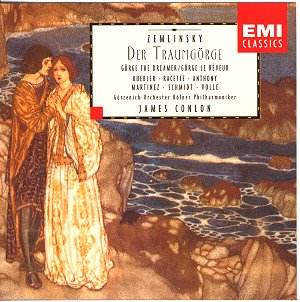Alexander ZEMLINSKY (1871-1942)
Der Traumgörge (1904-07)
An opera in two acts and an epilogue
 David Kuebler (Görge)
David Kuebler (Görge)
Patricia Racette (Gertraud)
Iride Martinez (Grete)
Andreas Schmidt (Hans)
with Susan Anthony; Michael Volle, Lothar Odinius, Zelotes Edmund Toliver,
Julian Rodescu, Natalie Karl, John Pierce, Machiko Obata.
Opernchor der Musikhochschule Köln
Gürzenich-Orchester Kölner Philharmoniker/James Conlon
Rec 6-8 July 1999, Köln
 EMI CLASSICS CDS5 57087
2 CD1 [72.55] CD2
[74.32]
EMI CLASSICS CDS5 57087
2 CD1 [72.55] CD2
[74.32]
Crotchet
£25
Amazon
UK £28 Amazon US

No-one hearing Zemlinsky's Der Traumgörge would be allowed to
mistake it for anything other than grand 'Grand Opera'. A high, warm and
rich romantic tide and surge pushes and harries the music. This is so much
so that one may be tempted to bless the balm-like choral contributions in
Grüss Gott (CD1 - 9), in track 10 (2.19) and a swooning
operetta-style men's song at 2.48 (CD1 - 7).
This is not a Straussian opera; rather parallels can heard with Othmar Schoeck's
Massimila Doni which, it has to be said, is more memorable, with
Schoenberg's Gurrelieder and with Schreker's magical Die Ferne
Klang (more inventive from the point of view of orchestration and
thematically). Mahlerian touches are much in evidence. Zemlinsky must have
been steeped in the scores of Mahler's symphonies. Listen to the underpinning
orchestral fabric at 3.19 (CD1 track 12) under David Kuebler's quietly tranced
tenor line as his character (Görge) sings staring into the clear river
waters. The second act and epilogue are prone to a garrulous overdrive and
some of the invention is threadbare, however there is reward in plenty in
moments such as the sated heroic ardour of Kuebler (has he ever recorded
Das Lied von Der Erde?) in Ist das die Liebe (track
14 CD2) and more generally in the thunderingly emphatic storm of Da sind
sie! (CD2 track 15).
The plot: Görge, a young and naïve man is immersed in a fairy-tale
world. Grete, promised to him in marriage, is left and finds a seemingly
more suitable match when Görge, like Dick Whittington, sets off in search
of a fairy Princess. This hopeless idealism meeting brutal reality might
already remind you of Schrecker's Die Ferne Klang. He meets Gertraud
and sees in her his fairy Princess. After tribulations he returns home with
Gertraud where he becomes a teacher and he and his 'princess' clothe this
reality with a fairytale fulfilment - the dream realised in mutual happiness.
That happiness is consummated, floated and cherished in music of Delian repletion
as Gertraud and Görge, dreamers both (well, certainly Görge), sing
pianissimo Wir träumen …träumen …traumen und spielen
…spielen as the curtain slowly falls.
EMI Classics have been firm in their resolution to progress this series.
No doubt their resolution has been bolstered by the financial support of
Alexander-Zermlinsky-Fonds bei der Gesellschaft der Musikfreunde in Wien
and the Kuratorium Concert-Gesellschaft Köln. Conlon assures us that
the opera is presented uncut and faithful to the original. Conlon and his
team have even been through the score to redress the cuts made by Gustav
Mahler who commissioned the work.
It is worth pausing to note the EMI Zemlinsky series to date - all still
current and all with Conlon and the Gürzenich orchestra:-
Symphonies 1 and 2
CDC
556473 2
Seejungfrau/Sinfonietta
CDC
555515 2
Cymbeline/Tanzpoem/Frühlingsbegrabnis CDC 556474
2
Complete songs with orchestra
CDC
557024 2
Eine Florentinische Tragödie - opera CDC 556472 2
Der Zwerg (aka Der Geburtstag Der Infantin) - opera
CMS
566247 2
Complete Choral Works
CDC
556783 2
Every aspect of EMI's production breathes quality from the very assertive
sound image (listen to track 15 CD2) to the clear and atmospheric plates
that grace the booklet. The in-depth tracking (46 across the two carriers)
is referenced in the booklet to page numbers in the complete (French, German,
English) libretto. I must not overlook Antony Beaumont's sterling essay on
the opera.
Between EMI, Koch-Schwann and, most substantially, the elusive Capriccio
label all of the Zemlinsky operas including the rare Der König Kandaules
(as completed by none other than Antony Beaumont) have been recorded
at least once.
The young Zemlinsky may have fallen victim to prolixity but take it from
me there is plenty of gold and silver in this expressionist score.
Rob Barnett


